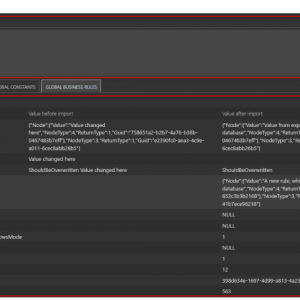Coming from developing individual web applications, for large projects, it would be practical to have a fourth environment to run WEBCON BPS
Instead of having only DEV/TEST/PROD, we would like to have DEV/TEST/INTEGRATION/PROD. or similar.
DEV/TEST would be in-house to develop and test the applications, and INT/PROD would be on the client's Infrastructure.
This would make change management and testing much easier and closer to our internal development guidelines.
Are there others working on very large projects, where this setup would be beneficiary.
Fourth environment of WEBCON BPS NOT NOW
We have a similar setup. The reason for this is not that they are large projects but we have regulatory "requirements":
- Development
Breaking and fixing stuff :)
- Informal test
We can easily deploy changes from dev here
- Formal test / Validation:
Deployment and tests needs to be documented s
- Production
Hi Marcus
I also work in an environment with 4 instances of webcon
A minor problem is setting the fourth unique environment type, we have 2 times TEST.
The only problem is importing to this environment if the data sources, constants have a different configuration, connection, than the second TEST.
I added copies of the TEMP_WFDataConnections and TEMP_WFEnvironmentGlobalVariable tables.
Which I periodically feed with data if after migration any connections, constants are different for these 2 environments.
During the next migration of processes, the trigger set on the migration history column (which changes after migration) calls a job that overwrites the table with the correct data that I fed earlier.
it works quite well, you have to remember to stick to global constants so as not to overwrite local ones in the process (too much work with this), or instead of constants add business rules, etc. You also have to feed these local tables TEMP_WFDataConnections and TEMP_WFEnvironmentGlobalVariable from time to time if after migration new sources, constants, different in the context of configuration for TEST - TEST are added
Regrds
Hi Marcus
I also work in an environment with 4 instances of webcon
A minor problem is setting the fourth unique environment type, we have 2 times TEST.
The only problem is importing to this environment if the data sources, constants have a different configuration, connection, than the second TEST.
I added copies of the TEMP_WFDataConnections and TEMP_WFEnvironmentGlobalVariable tables.
Which I periodically feed with data if after migration any connections, constants are different for these 2 environments.
During the next migration of processes, the trigger set on the migration history column (which changes after migration) calls a job that overwrites the table with the correct data that I fed earlier.
it works quite well, you have to remember to stick to global constants so as not to overwrite local ones in the process (too much work with this), or instead of constants add business rules, etc. You also have to feed these local tables TEMP_WFDataConnections and TEMP_WFEnvironmentGlobalVariable from time to time if after migration new sources, constants, different in the context of configuration for TEST - TEST are added
Regrds
Hi Karol,
that's an interesting approach. I never thought of it. :)
My approach was to create an "import" process which makes a snapshot of the data before the import and again one after the import. This way we can check what changed and correct elements if necessary.
With BPS 2024 we can integrate the import of the package into this process. :)
https://daniels-notes.de/posts/2024/importing-applications-using-an-application#displaying-the-changes
Regards,
Daniel
Hi Karol
This is an interesting approach I did not think of. Will have a look at this.
Regards
I forgot to mention that we have an additional licence for this environment, and it's not like you're going to run a second TEST on the same licence :)
Regards.
We hear you and acknowlegde that there are scenarios requiring more than 3 environments.
At this point we don't plan to introduce OOTB functionality to assign a fourth environment due to the numerous implications that would have to be accomodated.
With that said, we'll assist with every single case where more than 3 environments are needed, just contact our support.





